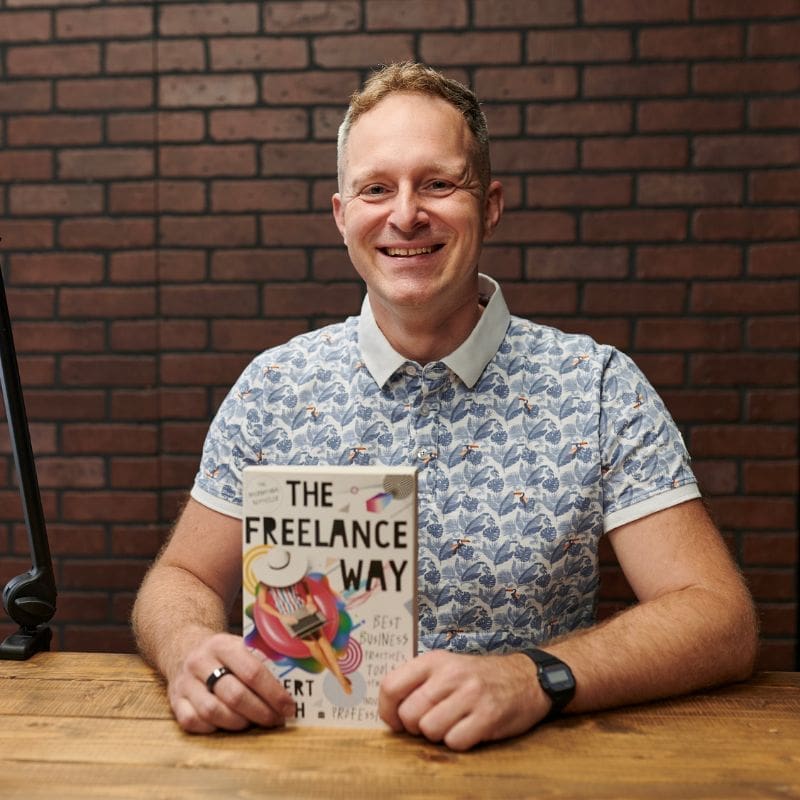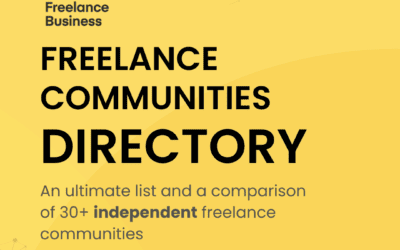Robert Vlach is a senior business consultant, specialising in supporting independent professionals and business owners. In 2005, he founded one of the largest national freelance communities in Europe, which he later expanded into Freelancing.eu. In 2012, he founded Europe’s first think-tank for freelancers which meets regularly in Prague and other cities, as well as online. He has been holding freelancing courses for more than a decade, and has consulted on over 300 business cases with individuals, startups, and companies.
Some time ago, he sat down with Elina to talk about his own freelance journey, the state of the freelance economy, his instant international bestseller The Freelance Way, and more. Read the expanded transcript of the interview highlights below, and watch the full masterclass here.
Elina: How did you start your independent career?
Robert: My story is not that original. I come from an entrepreneurial family. My parents started a company when I was 12, and I was kind of taken aback when I saw how hard it is to run a business. So as a teenager, I made up my mind that I would never be a businessperson. It seemed like too much energy invested to just make a living.
Then I went to Spain with a friend. Initially, I hoped to find some seasonal work, but I ended up working as an independent contractor for a local client. I became a contractor and a web developer in the late 1990s, so I’ve already been freelancing for more than 20 years. I really loved the strong sense of independence that came within the project because I was the lead developer and I had an enormous amount of freedom to influence the client and what we were working on. Suddenly, I could imagine that I would be an entrepreneur of sorts—a freelancer—and I became one. I think that this is quite a common journey for freelancers. We often start off with a single client, and use it as a test to see if we have what it takes or not, whether we like it or not…
I found out that I liked being a freelancer who was hired by clients. After some years abroad, I returned to the Czech Republic. And besides doing my daily work as a freelancer, doing some web projects, I started to take an interest in what other freelancers were doing. At that time, no nation-wide freelance community existed in the country, so I decided to start one. It started small, but it gradually became, well, not the largest, but one of the most active freelance communities in Europe. We currently support over 200,000 Czech freelancers in their business. My latest venture Freelancing.eu, launched in 2020, is basically taking the know-how we have developed over the years to help freelancers all over Europe along the same lines as we have done since 2005 on a national level.
This is my origins story in a nutshell. I’m also a business consultant. Gradually, I did fewer web-related projects and more business-related ones. I studied at a business school, so it was my original field of expertise. I combined the two to create a community and learned how to support it over the years. Taking care of the community is yet another completely different part of what I do. It’s quite distinct from the consulting work, because organising a community is special. It has an entirely different place in my life, and I love it. I still have my daily work for clients on projects, and then there are these community-related activities that are also related to my book and to the projects that run online.
I’ve spent a lot of time thinking about what unites all independent professionals. When I was writing the book and helping the community to grow, we were actually researching most of the services available for freelancers both in the US and in Europe. There are many traits that we all share. One of the major ones (and this is probably also the reason why we as freelancers get along with each other so well) is this: If you ask full-time freelancers what are the major advantages of being a freelancer, they often respond that they like the freedom. They like the independence. They like the flexibility. They like being their own boss. So there is a strong appreciation for being free, being independent and being able to sustain yourself. These are basic values that bind us together. We have these shared attitudes towards freedom. But I have to add that this is mainly relevant to full-time freelancers only. Because there are part-timers who often treat freelancing only as a sort of side income and for them this is only a minor issue. They may have regular day jobs and being a freelancer part-time is perhaps only about earning some extra income. So they often don’t have this freedom-loving philosophy behind it.
We did a small survey and asked freelancers what they most enjoy about being independent and the most common answer was freedom in its different forms…
Yeah, freedom is so beautiful. But it also has a downside. If we look at the cons that people mention, usually the major shared concern with freelancers is there are financial swings. When you are not employed, you don’t have a steady paycheck. There is often also a concern of having a dividing line between work and your personal life, work-life balance, or about who can cover for you, in case you are sick or away on a holiday. This can genuinely be a problem, especially for advanced freelancers, if there is no one that can step in for them.
I think that because we have these pros and cons that bring up strong emotions when freelancing, it is very important to build a system in your business that supports you whether you are feeling great or down at the moment. That’s actually one of the reasons why I wrote The Freelance Way. I wanted to help freelancers to be much more systematic in preparing themselves and their business for moments that are unexpected or unprecedented, since these have to be handled well in order to keep the business going.

What is important to take into account when you set off on the freelancing journey? Where to start? What’s the most important thing that you would recommend?
What I would recommend to beginners is not to take huge risks when starting out. In the service sector, the most common strategy is called small bets. It means that you don’t sell a car, or a house, and start freelancing right away, burning all bridges behind you. Instead, you have your day job or your studies and you start taking small jobs and small assignments bit by bit, trying to figure out whether you have a kind of expertise that can be sold on the free market. Because each skill, each expertise has a different price and value. There are skills that are not valued too much by the market and there are skills that are very rare and in high demand. This influences the price for them. Importantly, you are also finding out whether you have what it takes to work with a client, whether you are comfortable with an environment like the free market, whether you are able to deal with the common situations that may occur, etc.
You take these little bets and by doing so you are learning whether it actually makes sense for you to step up the game, quit your day job and go full-time or to invest more time into developing your other business skills. This is one way to tackle it and it is a tried and true strategy. It is extremely well described in a book by Cal Newport titled So Good They Can’t Ignore You, certainly one of the best books on career strategies ever. It’s really well-written, it’s based on data, on his research, and he’s making quite a strong case there.
So test the waters before you fully commit yourself. You may also find out that you don’t like the first two or three projects or gigs and that you will need more time to think about whether this was the right path for you or figure out what was wrong about them. If it seems that it’s not okay, remember that you can always try again in a half year or so or consider doing things differently. In either case, you’ll be better prepared.
The most frequently asked question that I come across in all the groups is whether freelancers should work for free. What do you think?
There are so many different attitudes towards doing freelance business, that I often don’t have a simple recommendation and this is also the case. First of all, there are professions that are prone to so called spec-work or speculative work, especially for creatives who are often approached to do work for free. But it may also occur in some other professions. However, I have several guidelines here.
First of all, I wouldn’t recommend working for free as the best way to start freelancing. You have to start somehow, but there are better ways. Working even for small rewards is probably better because you are already getting something for your efforts and at least on some level this can be a way of starting to think about the prices you have, right?
But if you are going to do unpaid work, I suggest that you approach it like a boss. You are providing clients with your work. It’s your voluntary decision and so you shouldn’t be the one that is being pushed around and directed somewhere where you don’t want to be. If you decide to do free work, state it clearly that you are doing something for the client and that it’s not a given, but that you decided to do it because you want to support their cause. Whenever you do free work, just state the rules — you’re the boss there. You are setting some boundaries and you are not obliged to play by someone else’s rulebook. You are establishing the rules there. It goes way back to the principles of good business negotiations. You have to improve somehow when it comes to negotiations, so you might as well start right there, right now.
And second: If it’s free work for a non-profit or a friend or a family member, you may really need it to gain some experience. But I would recommend making sure that you are able to leave that position as soon as possible. When you have whatever recommendations that you were expecting to get from it or when you have the experience that you were hoping to gain, just be prepared to move on to better, paid work. I don’t have a problem with starting from zero, or a low price, if you are willing to raise and alter your price fast as you gain expertise and develop a better reputation.
When you start, how do you validate your pricing? And how to raise your prices? Hourly rates or project-based fees?
Pricing is a huge area of freelance business and I have gotten a little bit sceptical of giving simple recommendations over the years there as well, because it’s so vast. If you look at a particular field, there may be some kind of habitual pricing or some special conditions that totally don’t apply to a different industry or profession. So it’s pretty hard to generalise, but I will try.
When talking about pricing, I’m always concerned about the most grave errors that freelancers make in this regard. And I have to say there are two areas to focus on. First, with beginning freelancers, the single most problematic issue is that they are not willing to raise prices, or are too conservative about it. They are scared that if they raise their price they may lose clients, or that it will cause some other problems.
This is really important. As a freelancer you will absolutely need to raise prices over time and there is a straightforward reason. When you are starting out you probably have really low rates and you have (theoretically) 100% free capacity. You don’t have clients so you are selling your time for a really low price. But over time, there are several pressures that are going to force you to reevaluate your pricing.
First of all, you are going to have more clients so there is a rising demand. If you are doing great work, people start recommending you, so your capacity is gradually filling up. This is one of the things that needs to be addressed.
The second thing would be that your productivity is not great in the beginning, you are not very productive. You don’t have the tools, you don’t have the experience, so you are doing things clumsily for a long time, where an experienced freelancer would be doing it right away and in no time, right? So as your productivity rises this has to be reflected in the price as well.
Your reputation is also getting stronger. This is what happens when we as freelancers start out. We have low prices and we gradually have more work. So you eventually reach a point where you are pretty much fully booked. Say, working at or over your full capacity. Usually when this happens, freelancers tend to rework their productivity. They realise that they are not efficient in some areas and they are just digging into some methods, some systems, on how to be more productive. So you stop doing things that are not effective and become more productive. This enables freelancers to have some extra time to be allocated for clients, right?
But because you are still doing good work and people are recommending you, you are soon going to reach that point once more. You are fully booked up—again. And this is a very crucial point. Because a common mistake done by freelancers is that they are afraid to raise their prices to suppress the overall demand, or drop some clients looking for cheap work that they don’t want to do anymore. This is not a popular choice with freelancers. So what most of us do when we are less experienced, we work more. So now we are no longer working at 100%, but we are working at 130% or 150%, which means we not simply work eight hours a day, but we are working twelve hours or we are working on weekends. Which is not really healthy and sustainable long-term, as we all know.
So increasing prices would be one solution. Another solution might be to hire some colleagues and act like a small agency or company. This might end up becoming more of a traditional company business over time. There’s more of you, so you will try to create some culture, some brand, and this would lead you from being a freelancer to being a freelance business owner, and then perhaps a typical agency or company.
That’s an option if you have this kind of rising demand, but in this case you don’t react by raising the price but by increasing the productive capacity. However, if you decide to stay in freelancing, you cannot increase your capacity forever. Over time, you will find out that raising the price is what you should do, but the problem is that freelancers mostly realise this too late. We are scared to approach a client and discuss that something needs to be done about the price. But it’s really important to be assertive and learn how to set up your pricing as a freelancer in a dynamic fashion. Because you cannot have a fixed price in a totally dynamic environment. We all know that markets fluctuate, and you need to adjust your price to reflect this as well.
When is the moment to raise prices? Before you are working at your full capacity. The more overworked you are, the less likely it is that you will want to enter into these difficult conversations with clients and discuss prices.
It’s important to learn to raise your price slightly while you are still okay, while you still have capacity to work more, because you need to leave some capacity free for sudden opportunities that just come out of the blue.
What we should learn, if we are beginners as freelancers, is to raise the price much sooner than we would intuitively do. I can also put this in a different way. If you worked for a client, say, for €20 per hour five years ago, and they now come back to work with you again, and you still charge €20-25 per hour, what signal does it send? It sends a signal that you have not evolved, that you are basically still the same beginner you were, that you haven’t improved as a businessperson. That price says a lot about you. You are sending a strong signal by setting a price, and you should be aware of what that signal is.
Finally, the second area of concern is that if you are a more advanced freelancer, it is good to learn some advanced pricing methods to price your work. Don’t stick to a single method, bending it to fit all kinds of projects. Each method has its limitations. Go through alternative pricing models, try them out with a client or two, and see whether they work or not.
You can see the full masterclass interview here!
Visit Freelancing.eu here.
Connect with Robert on LinkedIn.
Buy Robert’s book here.




